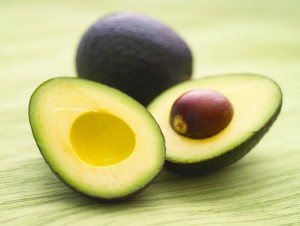The myth persists that high fat foods gunk up your arteries and pad your hips. But it’s just not true especially when it comes to the highest fat fruit on the planet – the avocado (Persea Americana).
In fact, science gives high marks to avocados when it comes to protecting your heart and maintaining a healthy weight. Recently the HASS Avocado Board commissioned a review of the studies on avocados and their nutrients.[1]
The review cites 125 studies and other sources supporting the actual and potential health properties of avocados. They contain a wealth of vitamins, minerals, fats, and phytochemicals. Just one-half an avocado (about 68 grams) contains the following nutrients:
| Dietary Fiber | 4.6 grams |
| Potassium | 345 mg |
| Sodium | 5.5 mg |
| Magnesium | 19.5 mg |
| Vitamin A | 43 mcg |
| Vitamin C | 6.0 mg |
| Vitamin E | 1.3 mg |
| Vitamin K1 | 14 mcg |
| Folate | 60 mg |
| Vitamin B-6 | 0.2 mcg |
| Niacin | 1.3 mg |
| Pantothenic Acid (Vitamin B-5) | 1.0 mg |
| Riboflavin (Vitamin B-2) | 0.1 mg |
| Choline | 10 mg |
| Lutein/Zeaxanthin | 185 mcg |
| Phytosterols | 57 mg |
| Monounsaturated Fatty Acids | 6.7 grams |
| Sugar | 0.2 gram |
Avocado oil contains 71% monounsaturated fat, 13% polyunsaturated fat, and 16% saturated fat. As the avocado ripens, saturated fat decreases and monounsaturated fat increases.
That nutritional profile adds up to a long list of health properties. Here are just some of them.
Avocados Are Heart Healthy
Eight preliminary clinical studies show that eating avocados helps support cardiovascular health.
Data from the National Health and Nutrition Examination Survey (NHANES) 2001-2006 suggests that people who eat avocados have higher good HDL-cholesterol. They also have a lower risk of metabolic syndrome, and lower weight, BMI, and waist circumference.[2]
In the first clinical study of avocados in 1960, men who ate a half to one-and-a-half avocados a day did not raise their cholesterol levels. In fact, half the men reduced their cholesterol by 9-43%. And none of the subjects gained weight when they added the avocados to their regular diet.[3]
Since then at least six studies have suggested that adding avocados to the diet has a positive effect on blood lipids compared to a low-fat, high carbohydrate diet.
As the Hass researchers point out, one avocado (about 136 g) is very similar in nutrient and phytochemical content to 1.5 ounces (42.5 g) of heart healthy tree nuts (almonds, pistachios, orwalnuts) with less than half the calories.
Nutrients that contribute to the avocado’s heart benefits include the following:
- Dietary Fiber. The carbohydrates in avocados consist of about 80% dietary fiber, comprised of 70% insoluble and 30% soluble fiber.[4]
- Low Sugar. Avocados contain very little sugar compared to other fruits. Their glycemic load is close to zero. The primary sugar in avocados is a unique seven-carbon compound called D-mannoheptulose. Half an avocado contains about two grams of the reduced form of this sugar (perseitol). But perseitol isn’t counted as a sugar because it doesn’t behave nutritionally like a sugar.[5] Research suggests D-mannoheptulose may support blood glucose control and weight management.[6]
- Potassium. One avocado has about twice the potassium of a banana. Clinical studies suggest potassium may help control blood pressure. Avocados are also naturally very low in sodium.
- Antioxidant Vitamins. Avocados contain significant levels of both vitamins C and E. Clinical research suggests a combination of vitamin C and E may slow the progression of atherosclerosis in people with high cholesterol.[7]
- B-vitamins. Avocados are a healthy source of B vitamins. Deficiencies in B-vitamins such as folate and B-6 may increase homocysteine levels. High homocysteine may reduce vascular endothelial health and increase the risk of cardiovascular disease.
- Carotenoids. Avocados have the highest fat-soluble antioxidant capacity among all fruits and vegetables.[8] The primary avocado carotenoids are a subclass known as xanthophylls. These are fat-soluble antioxidants. Xanthophyll carotenoids include lutein, β-cryptoxanthin, and zeaxanthin.
Results from the prospective Los Angeles Atherosclerosis Study suggest that higher levels of plasma xanthophylls may be protective against early atherosclerosis.[9]
In Hass avocados, xanthophylls lutein and cryptoxanthin contribute about 90% of the total carotenoids. The highest carotenoid levels are concentrated in the dark green flesh of the fruit under the peel as opposed to the lighter green in the center or the yellow flesh near the pit.
Your body needs fat to absorb and use carotenoids. Avocados have naturally high levels of both. Research shows adding avocado to salad without dressing, or serving avocados with salsa increases carotenoid bioavailability by 2–5 times.[10]
Avocados Promote Weight Loss
Several clinical studies suggest avocados support weight control.
In one study 61 overweight or obese subjects were put on a weight loss plan. Half were also asked to substitute one and a half avocados (200 grams) every day for 30 grams of other fats such as margarine or oil. After six weeks both groups lost similar amounts of weight, body mass index (BMI) points, and percentage of body weight even though the avocado group was eating much more fat.[11]
And in a randomized, crossover study of 26 healthy overweight adults, those who ate half an avocado at lunch reported significantly less hunger and desire to eat, and increased satiation.[12]
In another study, animals were fed a high-fat diet with or without the addition of an extract of avocado. After 14 weeks, the group getting the avocado extract exhibited a lower BMI and fat mass, as well as lower LDL cholesterol. The researchers believe the avocado increased the activity of adiponectin, a hormone secreted by fat cells that regulates blood glucose. Higher adiponectin helps reduce the risk of obesity.[13]
Read the rest of this informative article here

